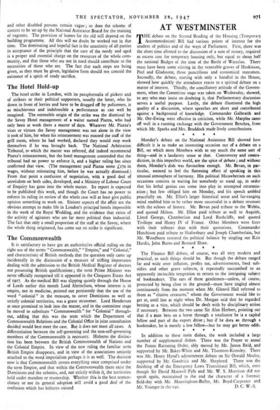The Commonwealth
It is satisfactory to have got an authoritative official ruling on the right use of the terms " Commonwealth," " Empire," and " Colonial," and characteristic of British methods that the question only came up incidentally in the discussion of a measure of trifling importance dealing with the admission to the British Medical Register of doctors not possessing British qualifications ; the term Prime Minister was never officially recognised till it appeared in the Chequers Estate Act of i917. As the medical Bill was slipping quietly through the House of Lords earlier this month Lord Altrincham, whose interest is in empire, not in medicine, pointed out pertinently that the use of the word " colonial " in the measure, to cover Dominions as well as strictly colonial territories, was a grave misnomer. Lord Henderson at once promised to look into the matter, and in the committee stage he moved to substitute " Commonwealth " for "Colonial " through- out, adding that this was the term which the Department of Commonwealth Relations and the Colonial Office in joint consultation decided would best meet the case. But it does not meet all cases. A differentiation between the self-governing and the non-self-governing members of the Commonwealth is necessary. Hitherto the distinc- tion has been between the British Commonwealth of Nations and the Colonial Empire. In view of the new ruling the familiar term British Empire disappears, and in view of the associations unjustly attached to the word imperialism perhaps it is as well. The decision now is that Commonwealth covers everything once comprised under the term Empire, and that within the Commonwealth there exist the Dominions and the colonies, and, not strictly within it, the territories held under mandate or trusteeship. Whether this is the best nomen- clature or not its general adoption will avoid a good deal of the confusion which has hitherto existed.




























 Previous page
Previous page